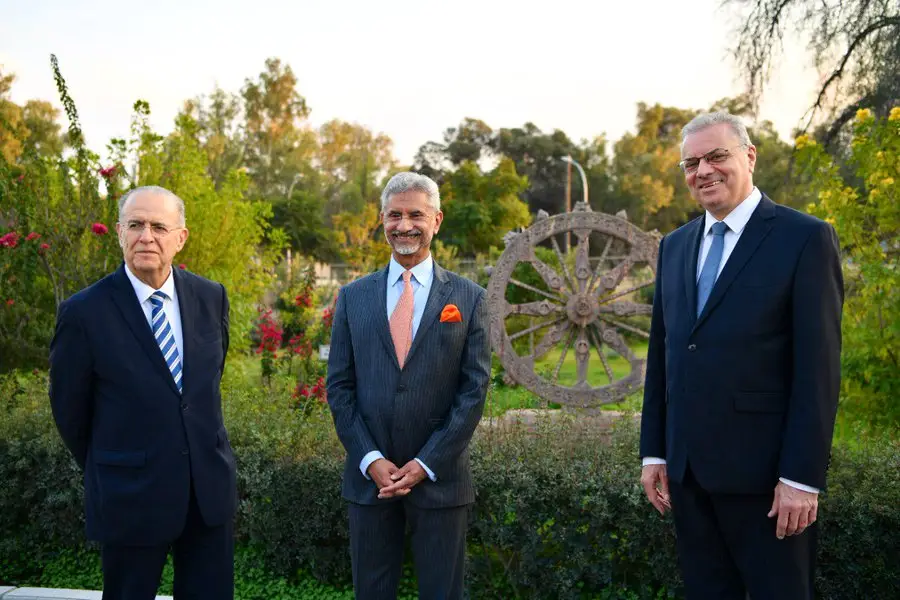

External Affairs Minister Dr S Jaishankar at the Konark wheel with Cyprus Foreign Affairs Minister Ioannis Kasoulides and Interior Minister Nicos Nouris (Photo: @DrSJaishankar)
External Affairs Minister Dr S. Jaishankar recently concluded what can be billed as a hugely successful visit to Cyprus (and Austria), signing agreements in three major areas – defence, migration, and the International Solar Alliance. Cyprus is not a country that is usually on India’s strategic radar, yet in recent years sufficient effort has been put into the relationship with it. Traditionally, India and Cyprus have enjoyed cordial relations.
The modern history dates back to India’s first Prime Minister Jawaharlal Nehru and to the non-aligned movement of which Cyprus became a member. Political engagement between the two sides as well as trade has flourished. Between April 2000 and September 2015, Cyprus invested a cumulative total of $8.328 billion making it the eighth largest FDI investor in India. Most of the investments are in the construction and real estate industries.
Indian military has participated in United Nations peacekeeping operations in Cyprus on numerous occasions. Cyprus supports the India–United States Civil Nuclear Agreement, and also supports India within the Nuclear Suppliers Group (NSG) and the International Atomic Energy Agency (IAEA), as well as India’s candidature for a permanent seat at the UN Security Council.
Cyprus’ strategic location gives it a certain leverage, despite being a small island country, it connects the Gulf with Europe, and has pitched itself as a gateway to Europe. Certainly, Cyprus played an important role in helping India evacuate its citizens when in 2006, war broke out between Lebanon’s Hezbollah and Israel.
In recent years, however, new momentum has been imparted in bilateral relations thanks to Turkish occupation and recognition of Northern Cyprus as a separate state, its recent belligerence both in the Eastern Mediterranean and in South Asia. Turkey’s Kashmir stand and its support to Pakistan has caused sufficient unease in India. Along with President Reccep Tayib Erdogan’s strident anti-India stand vis-a-vis Kashmir in the UN, recent reports have focused on how Turkey has become a base for Kashmiri secessionist activities. In the Eastern Mediterranean too, Turkey has sharply escalated tensions with Greece, its traditional adversary. Turkey has also paved the way for closer Pakistan and Azerbaijan relations, with the South Caucasian country also taking a pro-Pakistan stance regarding Kashmir.
Cyprus, on the other hand, has always supported the Indian position on Kashmir in the international arena.
With Turkey cozying up to Pakistan, India began deepening engaging with a host of other states, including Cyprus, reiterating its support for Cyprus’ territorial integrity and sovereignty, and for resolution of the Cyprus conflict in accordance with relevant UN resolutions. Cyprus rejects partition of the island, while Turkey is the only country to recognise the independence of Northern Cyprus.
A recent summit of Turkic states, however, has paved the way for greater India-Cyprus cooperation. At the first-ever summit of Turkic states (Azerbaijan, Kazakhstan, Kyrgyzstan, Turkey and Uzbekistan, with Hungary and Turkmenistan as observer states) in Samarkand, Uzbekistan in November last year, Northern Cyprus was granted observer status.
“The Turkish Republic of Northern Cyprus has been accepted as an observer member to the Organization of the Turkic States. We will stand with the TRNC everywhere and every time,” Turkish Foreign Minister Mevlüt Çavuşoğlu announced on Twitter during the summit. Currently Turkey is the only country that recognizes the “Turkish Republic of Northern Cyprus”. In Samarand Turkish President Tayyip Erdogan said “we contributed to a solution, illustrating that our Cypriot brothers and sisters – who are a core part of the Turkish world – are not alone.”
This certainly is a development as observer status for Northern Cyprus implies its acknowledgement by the other member states of the Turkic council, besides Turkey, which yields major influence in the council.
This has certainly rung alarm bells in Nicosia, with the government condemning the move. The Cyprus Foreign Ministry issued a statement calling the move “meaningless” “The fact that Turkey itself promoted and chose to accept the downgrading of the participation of the pseudo-state to the status of ‘entity’ and not ‘state’, proves the obvious,” The European Union issued a sharp statement rejecting the move which it said was “regrettable” and “…. that the EU recognises only the Republic of Cyprus as a subject of international law, in accordance with the respective UN Security Council Resolutions…. the EU is fully committed to a comprehensive settlement of the Cyprus problem based on a bi-zonal, bi-communal federation with political equality, ….”
Last year in Islamabad, Pakistan, Turkey, and Azerbaijan had issued a statement pledging to back each other on Kashmir, Northern Cyprus, and on Nagorno-karabakh.
Ahead of Jaishankar’s Cyprus visit, Cyprus said that it would be discussing “Turkish provocations” with the Indian foreign minister. Meanwhile, in the joint press conference, Jaishankar said “India reiterates its commitment to a bi-communal, bi-zonal federation based on UN resolutions as the solution to the Cyprus issue.”
In this context, India offers a valuable partnership in defence, military, and strategic field to Cyprus. India has similarly been fast-tracking its strategic engagement with Greece too. Amongst other things, in Nicosia Jaishankar said that the Mediterranean region was becoming increasingly important to India and the Mediterranean region would see more of India in future and the relationship with Cyprus will be an anchor in India’s endeavours. Thanks in large part to the Turkic council’s folly, which has spurred greater India-Cyprus cooperation.
Australia's High Commissioner to India, Philip Green OAM, called Yoga one of India's gifts to…
The Bharat Sanchar Nigam Limited (BSNL) has announced the soft launch of BSNL Quantum 5G…
The Indian Embassy in Iran has said that the embassy will make efforts to evacuate…
India's gross direct tax collections for the financial year 2025-26 rose by 4.86 per cent…
Russian President Vladimir Putin has said that Moscow is not seeking Ukraine's unconditional surrender, but…
Extending his greetings on the 11th International Day of Yoga, Lok Sabha speaker Om Birla…